上海版牛津英语7B资料
上海版牛津英语7B7B 一单元知识点笔记

7B 一单元知识点笔记1. a travel guide 一个旅行向导2.suggest---suggestion (可数)-----suggest sb doing sth 建议某人做某事3.have just been to去了回来了/ have just gone to 去了没回来4.decide---decision ----decide to do sth5.take part in参加比赛、join in 参加要成为一员attend 出席petition 比赛,竞赛7.an interesting city 一个有趣的城市8.design----designer 设计师9.different local snacks 不同的当地小吃10.in group 以小组形式11.make a list of 做一个表单12.for sightseeing/ for shopping/ for eating 观光,购物,13.in the centre of/ south of 在……的……方向14.on Chongming Island 在崇明岛上15.get on well with sb 与……相处融洽16.be in the east of Shanghai 在上海的东部17.an international city 一个国际的城市18.one of the largest cities 最大的城市之一19.be known as 作为……而著名20. a lot of department stores 许多购物商店21.It is surprising that +句子……是令人吃惊的22.If you go there, you will see a huge open area with green grass and trees. (主将从现)23.It is convenient to do sth ……是方便的24.difference between A and B A和B的不同点25.in about eight minutes 在大约8分钟之内26.an observatory 一个天文台27.for fun 乐趣28.content 目录29.tour----tourist30.reason----reasonable31.orient----oriental32.century-----centuries33.technique----technology34.sight----sightseeing35.there----therefore36.surprise----surprising----surprised37.float---floating38.think of 认为39.think about 思考40.Shanghai is famous for its night view.41.。
(完整版)上海牛津英语7B词汇练习和基础练习

上海牛津英语7B Unit 1 词汇练习姓名__________ 班级__________ 得分__________1. 旅游建议_________________________2. 决定做某事________________________________3。
参加一个竞赛__________________________ 4。
提出一些建议______________________________5。
设计一份旅游指南______________________ 6。
在大型百货商场____________________________7。
地方小吃______________________________ 8。
去人民广场________________________________9。
世纪公园______________________________ 10。
上海植物园_______________________________11。
东方明珠电视塔_______________________ 12。
在上海的中心_____________________________13. 在上海的东部 ________________________ 14. 在崇明岛________________________________15. 最大的城市之一________________________ 16。
去那儿__________________________________17. 因……而著名__________________________ 18. 被认为,誉为____________________________19. 上海科技馆____________________________ 20. 一个天文台______________________________21. 在浦东和浦西之间______________________ 22. 带某人去某地____________________________23. 一个有趣的城市________________________ 24. 约在8分钟内____________________________25。
英语(牛津上海版)7B知识点
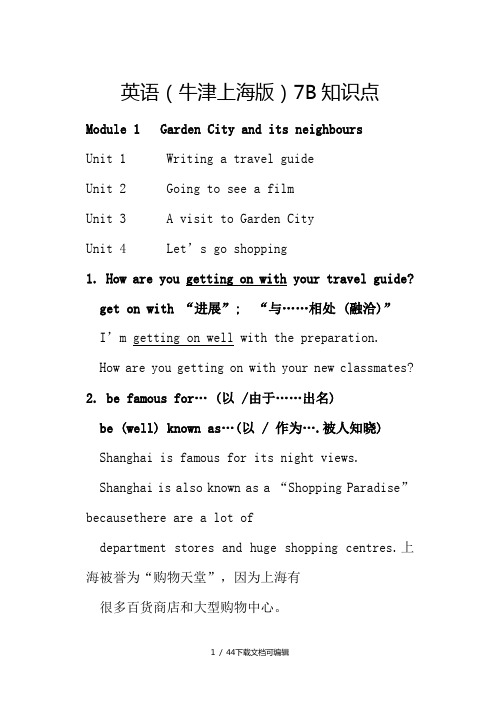
英语(牛津上海版)7B知识点Module 1 Garden City and its neighboursUnit 1 Writing a travel guideUnit 2 Going to see a filmUnit 3 A visit to Garden CityUnit 4 Let’s go shopping1. How are you getting on with your travel guide? get on with “进展”; “与……相处 (融洽)”I’m getting on well with the preparation.How are you getting on with your new classmates?2. be famous for… (以 /由于……出名)be (well) known as…(以 / 作为….被人知晓)Shanghai is famous for its night views.Shanghai is also known as a “Shopping Paradise” becausethere are a lot ofdepartment stores and huge shopping centres.上海被誉为“购物天堂”,因为上海有很多百货商店和大型购物中心。
Qingpu is famous for its fish and rice.3. It is + adj. + that (主语从句), 表示“……太……了”It is wonderful that we can have dinner on the 91st floor in Shanghai World Financial Centre.It is not surprising that many tourists come to visit Shanghai every year toshop.It is + adj. + to do sth.It is convenient to travel between Pudong and Puxi.=To travel between Pudong and Puxi is convenient. It is terrible to have dinner in this restaurant. The food tastes awful.=To have dinner in this restaurant is terrible.4. If you go there, you will see a huge open area with green grass, trees, fountains and pigeons. 主句用一般将来(或can, may, must),从句用一般现在时。
(完整)7B(上海版牛津教材) M1U1Writing a travel guide

Module 1 Garden City and its neighboursUnit 1 Writing a travel guide1.Guide n. 1 指南、导向 2 导游A tourist guide __to__ Beijing 北京游指南 A visit __to__ Beijing 北京游This is a _____ to Hongkong.A three days tourB three—day tourC three—days tourD three days touristThe guide took us around the castle. 导游带我们参观了城堡.Guide v. 为…领路,带领Martin guided him to the reception room。
马丁将他领到接待室。
2.Tour n. 旅行;旅游 tourist 游客 tourist guide 导游The guide conducted us on a tour of the oldest museum in the country。
导游带我们参观了这个国家最古老的博物馆。
tour v。
旅游;旅行;参观She spent her vacation touring Italy。
3.suggestion n。
[C。
] 建议 make some suggestions给出一些建议suggest doing sth. / suggest (that) sb。
(should) do sth.同义词:advice n。
[U.] give some advice 给出建议take one's advice / suggestions 采取某人的建议advise v. advise doing sth. / advise sb. to do sth.4.have been to, have gone to, have been inhave been to 去过某地 have gone to 已经去了某地 have been in 在某地呆了(一段时间)LiPing isn’t here. He _________ the library。
沪教版牛津英语七年级第二学期7B知识点总结

沪教版牛津英语七年级第二学期7B知识点总结沪教版牛津英语七年级第二学期7B 知识点总结1.tell sb. (not) to do sth. .告诉某人(不)做某事。
2.现在完成时(has/ have +done)+ since +过去式3.两句话一个连词,三句话两个连词。
4.on Hainan island 在海南岛5.if引导的条件状语从句:在条件状语从句中,如果主句是一般将来时,从句要用一般现在时代替一般将来时。
(主将从现)时间状语从句也有类似的用法。
6.between A and B 在A和B之间。
7.be late for 因……迟到。
8.感叹句:How +adj.+主语+谓语!What+[(a/an) + adj+]名词+主语+谓语!9.in+一段时间,用How soon提问问频率,用How often提问问多长时间for+一段时间,用How long提问。
10. help sb. do sth. .help sb. to do sth. .help sb. with sth. .帮助某人做某事。
11.an architect 一个建筑师。
12.this new pair of 这双新的……these new pairs of (复数)13.ask sb. (not) to do sth. 要某人(不)做某事。
14.try it on 试穿一下。
(代词需要放中间)try on this pair of shorts = try this pair of shorts on 试穿一下这条短裤。
(名词可以放中间,也可以放词末。
)15.a uniform/ university/ useful book/ UFO16.主语为人,用ed结尾的形容词;主语为物,用ing结尾的形容词。
17.see sb./ sth. (not) doing sth.. 看见某人、某物(不)正在做某事。
see sb./ sth. (not) to do sth..看见某人、某物(不)去做某事。
旧版上海牛津英语7B知识点梳理
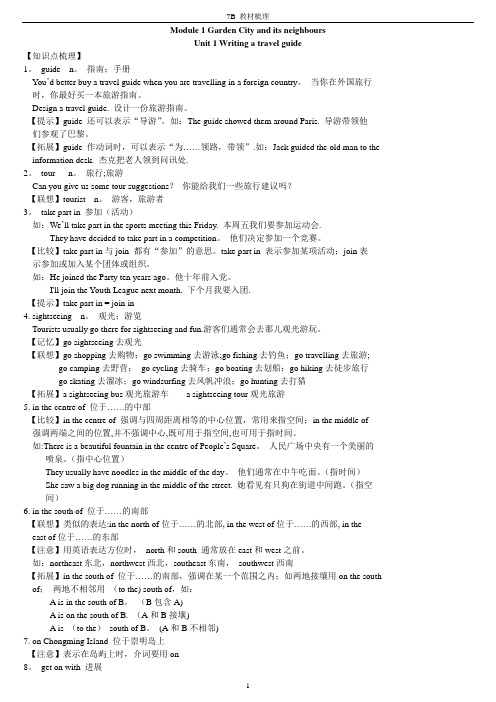
Module 1 Garden City and its neighboursUnit 1 Writing a travel guide【知识点梳理】1。
guide n。
指南;手册You’d better buy a travel guide when you are travelling in a foreign country。
当你在外国旅行时,你最好买一本旅游指南。
Design a travel guide. 设计一份旅游指南。
【提示】guide 还可以表示“导游”。
如:The guide showed them around Paris. 导游带领他们参观了巴黎。
【拓展】guide 作动词时,可以表示“为……领路,带领”.如:Jack guided the old man to the information desk. 杰克把老人领到问讯处.2。
tour n。
旅行;旅游Can you give us some tour suggestions?你能给我们一些旅行建议吗?【联想】tourist n。
游客,旅游者3。
take part in 参加(活动)如:We’ll take part in the sports meeting this Friday. 本周五我们要参加运动会.They have decided to take part in a competition。
他们决定参加一个竞赛。
【比较】take part in与join 都有“参加”的意思。
take part in 表示参加某项活动;join表示参加或加入某个团体或组织。
如:He joined the Party ten years ago。
他十年前入党。
I'll join the Youth League next month. 下个月我要入团.【提示】take part in = join in4. sightseeing n。
牛津初中英语上海教育上海版七年级下册7B

Unit 1 Module 1 Unit 1natural adj.自然的;天然的element n.要素control v.控制injure v.伤害cigarette n.香烟;纸烟end n.终点;末端project n.(研究)项目;专题研究question n.问题information n.信息happen v.发生careful adj.小心的kind n.种;类what kind of 什么样的cause v.引起hill n.小山screen n.屏幕page n.页answer n.答案above adv.在上面useful adj.有用的harmful adj.有害的discover v.发现wild adj.野生的;野的boil v.煮沸melt v.使溶化metal n.金属so that 以便shape n.形状glass n.玻璃vase n.花瓶put v.放;安置amount n.数量destroy v.破坏;毁坏everything pron.每件东西;一切lose v.丧失;失去seriously adv.严重地careless adj.粗心的thoughtless adj.欠考虑的;轻率的put out 熄灭;扑灭drop v.丢;扔everywhere adv.到处quiz n.测验card n.卡片fill in 填写carry v.携带;背着breathe v.呼吸equipment n.设备myself pron.我自己hose pipe n.水龙带Ladder n.梯子Axe n.斧头fire drill n.消防演习Rule n.规划Pack v.收拾(行李)装(箱)queue up 排队Downstairs adv.往楼下;顺楼梯而下switch off 关掉(电灯,收音机等)Fan n.风扇Staircase n.楼梯Title n.标题Sentence n.句子Else adv.别的;其他的Extinguisher n.灭火器Alarm n.警报Bell n.铃alarm bell 警铃;警钟fire hose n.消防水龙带Firefighting n.消防Ground n.地面ground floor 一楼Corridor n.走廊Main adj.主要的art and craft 工艺美术Music n.音乐Toilet n.卫生间;盥洗室Staff n.员工;职员Covered adj.有顶的covered playground 有顶的操场Unit 2 Module 1 Unit 2Wind adj.有风的Display n.陈列;展示Board n.木板;牌子display board n.展览板Again adv.再;又Gentle adj.柔和的Breeze n.微风Order n.顺序Column n.栏;列Typhoon n.台风Raincoat n.雨衣Tightly adv.紧紧地Windsurfing n.帆板运动Slightly adv.轻微的pinwheel n.纸风车countryside n.乡村caption n.说明文字fall v.落下sink v.沉没clean-up n.清扫;清除fiercely adv.猛烈地wave n.波浪suddenly n.突然sky adv.天空string n.线;细绳break v.断;折断immediately adv.立即lightly adv.轻轻地happily adv.高兴地;快乐地pass v.经过begin v.开始part n.部分high adj.高的observatory n.气象台slide n.幻灯片object n.物体pot n.罐safety n.安全precaution n.预防措施lock v.锁large a dj.大的shelter n.庇护所quickly adv.迅速地Unit 3 Module 1 Unit 3 quarter n.四分之一coral reef 珊瑚礁seaweed n.海草;海藻competition n.比赛;竞赛ocean n.海洋earthn.地球almost adv.几乎stream n.溪流;小河wonderful adj.精彩的;绝妙的;whale n.令人高兴的dolphin n.鲸intelligent adj.海豚shark n.聪明的dangerous adj.鲨鱼as well 危险的plantn.也;又starfish n.植物Oil n.海星salt n.石油pollute v.盐cover v.覆盖without prep.没有teeth n.牙齿(复数)shower n.淋浴wash v.洗涤;洗dish n.盘;碟nothing pron.没有什么nowhere adv.无处borrow v.借shower v.(洗)淋浴dripping adj.滴水的tap n.水龙头poster n.海报;招贴画save v.节约waste v.浪费fix v.修理turn off 关掉,截断(电流,煤气,水等)rather than 而不是;与其…宁愿…bath n.洗盆浴mug n.有柄的大杯Unit 4 Module 1 Unit 4forest n.森林hollow n.洞;孔fuel n.燃料carefully adv.仔细地summary n.总结;摘要sketchbook n.速写簿area n.地区;地域provide v.提供insect n.昆虫build v.建筑;建造ink n.墨水soon adv.不久clay n.粘土wool n.(羊等的)绒,毛plastic n.塑料can n.金属罐bowl n.碗plate n.碟;盘skin n.毛皮leather n.皮革belt n.腰带;皮带sand n.沙wooden adj.木制的woolen adj.羊毛的;毛纺的sock n.短袜pencil case n.铅笔盒purse n.钱包jug n.罐;壶robot m.机器人spoon n.调羹;匙chopstock n.筷子fork n.餐叉touch v.触摸feel v.摸起来;手感hard adj.硬的tablecloth n.桌布above adj.前文述及的;上述的Unit 5 Module 2 Unit 1 hospital n.医院architect n.建筑师;设计师make sure 确保builder n.建筑工人properly adv.恰当地;正确地mechanic n.机械修理工garage n.汽车修理厂repair v.修理van n.厢式送货车drive v.驾驶fire engine n.消防车secretary n.秘书type v.打字removal n.搬迁company n.公司removal 搬家公司move v.移动conversation n.谈话lift n.电梯of course 当然answer v.答复;回答phone n.电话meeting n.会议police n.警察police station n.警察局;派出所warden n.管理人;看守人traffic warden n.交通管理员policewoman n.女警察ambulance n.救护车ambulance man n.(救护车的)救护人员motorcycle n.摩托车knock down 撞倒crash v.碰撞;撞击go on fire 起火;燃烧motorcyclist n.摩托车手afraid adj.害怕的run away 逃跑scene n.现场phone v.打电话telephone n.电话stop v.使停止broken adj.伤残的;残缺的arm n.手臂leg n.腿sweeper n.清洁工work n.工作sweep v.打扫;清扫empty v.倒空;腾空balery n.面包店bake v.烘烤breakfast n.早餐market n.集市;市场seller n.销售者freshadj.新鲜的dinner n.正餐;主餐Unit 6 Module2 Unit 2balcony n.阳台estate n.住宅区agency n.代理机构bedroom n.卧室untidy adj.不整洁的;凌乱的put away 将收起;把放回原处tidily adv.整洁地;整齐地drawer n.抽屉shelf n.架子;隔板full adj.满的move v.搬(家);搬迁kitchen n.厨房sitting room n.客厅bathroom n.浴室;盥洗室find v.找到month n.月;月份bay n.海湾square adj.平方metre n.米decide v.决定lorry n.卡车;货运汽车shall aux.v将会next to 在…近旁;紧邻;在…旁边opposite prep.在对面between prep.在中间armchair n.扶手椅Unit 7 Module 2 Unit 3transport n.运输工具get to 到达steep adj.陡的;陡峭的step n.台阶quietadj.安静的;寂静的restaurant n.餐馆bottom n.底;底部convenient adj.方便的noisy adj.喧闹的busy adj.人来车往的;熙熙攘攘的peaceful adj.平静的pleasant adj.令人愉快的relaxing adj.令人放松的noise n.喧闹声;噪声lots of 许多season n.季节second num.第二third num.第三fourth num.第四Unit 8 Module 2 Unit 4west adj.西的,西方的turn v.转向intrusion n.说明mustn't 不准warning n.警告exit n.出口counter n.筹码dice n.骰子throw v.投;掷miss v.错过winner n.获胜者plantv.种植properly adv.正确地campsite n.野营地ahead adj.向前面;在前面space n.空格turtle n.龟hostel n.宿舍;招待所litter n.垃圾chase v.赶;追赶environment n.环境helmet n.头盔prevent v.防止Unit 9 Module 3 Unit 1race n.竞赛salty adj.咸的dumpling n.汤圆;饺子sweet adj.甜的fifth num.第五lunar adj.月亮的month n.月lunar month n.塑望月;太阴月celebrate v.庆祝hate v.讨厌bean n.豆sure adj.确信;肯定a little 一点儿born v.(仅用于被动语态be born)出生give v.给advice n.建议;忠告emperor n.皇帝listen to 听;听从was be的过去式(第一人称和第三人称单数)be good at 擅长…poem n.诗famous adj.著名的poet n.诗人battle n.战役;战斗'd rather 宁愿;宁可(=would rather)moon cake n.月饼pudding n.补丁pancake n.薄饼;烙饼cookie n.曲奇饼干sandwich n.三明治hamburger n.汉堡包lemonade n.柠檬味汽水1-UP n.七喜汽水Unit 10 Module 3 Unit 2surprise n.意想不到的事;令人惊奇的事Saturday n.星期六free adj.空闲的delicious adj.美味的cartoon n.卡通片;动画片look forward to 盼望;期待pity n.遗憾,可惜fish finger n.冻鱼条spring roll n.春卷spaghetti n.意大利式细面条meatball n.肉丸Coke n.可乐ingredient n.成分;原料power n.粉;粉末icingn.糖霜(用于装饰蛋糕饼)candle n.蜡烛secondly adv.第二;其次thirdly adv.第三fourthly adv.第四C (Celsius的缩写形式)摄氏度odd v.添加mix v.(使)混合gramme n.克mixture n.混合物baking tin 烤模spoonful n.一勺(的量)beat v.搅拌sift v.筛last det.最近的;上一个的wish v.祝愿Unit 11 Module 3 Unit 3smart adj.聪明的entertainment n.娱乐活动guide n.指南;手册concert n.音乐会circus n.马戏表演;马戏团history n.历史museum n.博物馆war n.战争match n.比赛programme n.节目funny adj.有趣的Sunday n.星期日called adj.叫做;称作afterwards adv.以后;后来neither adv.也不outing n.远足fall asleep 入睡;睡着feel v.觉得;感到tired adj.疲倦的;疲劳的Monday n.星期一Tuesday n.星期二Wednesday n.星期三Thursday n.星期四midnight n.午夜Friday n.星期五enough det.足够的mistake adv.错误地;不对discuss v.讨论future n.未来;将来less pron较少的;更少的fat adj.胖的bad adj.坏的;不良的habitn.习惯used to aux.v.曾经childn.小孩not any longer 不再spend v.花费pocket money n.零用钱save up 储蓄still adv.仍然;还Unit 12 Module 3 Unit 4 homeless adj.无家的get ready for 为准备sushi n.寿司tuna n.金枪鱼cucumber n.黄瓜carrot n.胡萝卜hot dog n.热狗(香肠面包)tomato n.番茄;西红柿sauce n.调味汁;沙司mustard n.芥末pie n.果馅饼scone n.烤饼sanmosa n.印度三角炸饺curry n.咖喱naan n.(松软扁平的)印度面包neighbour n.邻居teach v.教;训练England n.英国pleasure n.愉快;乐事self-raising flour n.自发面粉pour v.倒;倾倒dough n.生面团wide a dj.宽的sprinkle v.撒;洒tray n.盘oven n.烤箱;烤炉raisin n.葡萄干cookery n.烹饪;烹调Unit 13 Module 4 Unit 1 weekend n.周末hold on 别挂断;等一下moment n.片刻;瞬间pause n.停顿;暂停space n.太空adventure n.冒险cowboy n.牛仔swan n.天鹅duration n.持续时间princess n.公主prince n.王子enemy n.敌人full of 充满action n.动作king n.国王diary n.日记violin n.小提琴last for 持续drive n.(用于路名)路;大道bookstore n.书店lane n.胡同;小巷Unit 14 Module 4 Unit 2Santa Claus n.圣诞老人association n.协会more than 超过;多于prepare for 为准备Christmas n.圣诞节look for 寻找patient adj.忍耐的;耐心的hard-working adj.勤劳的friendly adj.有好的honest adj. 诚实的;正直的beautifully adv.美好地;美妙地sew v.缝interview n.面试advertisement n.广告message n.消息radio n.广播pretend v.假装turkey n.火鸡since prep.从以来;自以来popular adj.受喜爱的meal n.餐;一顿饭each other 互相song n.歌曲caroln.(圣诞)颂歌Christmas Eve n.圣诞夜;平安夜busy adj.忙碌的hang up 悬挂stocking n.长筒女袜Christmas Day 圣诞节believe v.相信;认为Jesus Christ n.耶稣exchange v.交换Boxing Day n.节礼日public adj.公共的holiday n.假日nearly adv.几乎;差不多choose v.挑选;选择picture n.图片dictionary n.词典;字典match v.将配对goose n.鹅decoration n.装饰queen n.王后dish n.菜肴tasty adj.美味的;可口的robin n.知更鸟ox n.公牛;公牛复数mince n.搅碎的肉;肉末stable n.马厩;马房Xmas n.(Christmas 的缩写)圣诞节Nobel n.圣诞节(用于歌曲和贺卡)holly n.冬青cracker n.彩色爆竹;彩色拉炮unwrap v.打开的包装circle n.圈;环状物pointed adj.尖的evergreen n.常青树voice n.声音;歌声shepherd n.牧羊人yule-log n.圣诞柴wreath n.花环;花圈word n.词;单词Father Christmas 圣诞老人tube n.管;管子coloured adj.彩色的paper n.纸pull v.拉noise n.声音;响声log n.木头;原木Unit 15 Module 4 Unit 3market n.商场anything pron.任何东西;任何事情jeans n.牛仔裤hole n.洞kid n.小孩cafe n.咖啡馆;小餐馆won't 不会collar n.衣领spot n.斑点sweater n.毛衣;线衣V-neck n.V字领check n.方格;方格图案round adj.圆形的stripe n.条纹;线条medium adj.中等的changing room n.更衣室over there 那里。
上海牛津英语7B讲解
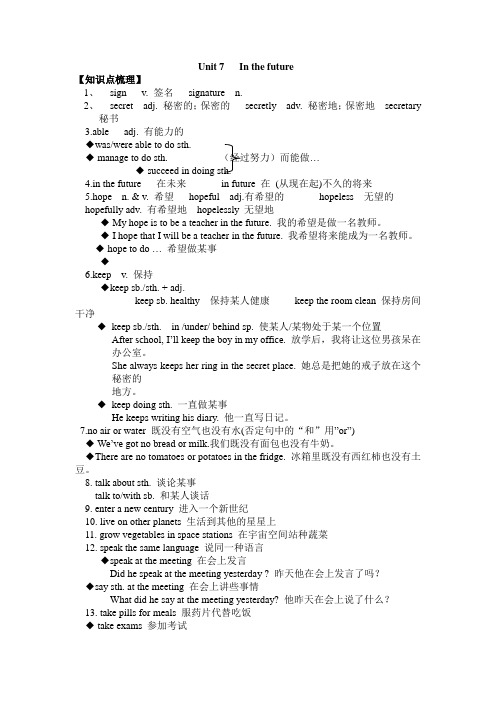
Unit 7 In the future【知识点梳理】1、sign v. 签名signature n.2、secret adj. 秘密的;保密的secretly adv. 秘密地;保密地secretary秘书3.able adj. 有能力的◆was/were able to do sth.◆ manage to do sth. (经过努力)而能做…◆ succeed in doing sth.4.in the future 在未来in future 在(从现在起)不久的将来5.hope n. & v. 希望hopeful adj.有希望的hopeless 无望的hopefully adv. 有希望地hopelessly 无望地◆ My hope is to be a teacher in the future. 我的希望是做一名教师。
◆ I hope that I will be a teacher in the future. 我希望将来能成为一名教师。
◆ hope to do … 希望做某事◆6.keep v. 保持◆keep sb./sth. + adj.keep sb. healthy 保持某人健康keep the room clean 保持房间干净◆keep sb./sth. in /under/ behind sp. 使某人/某物处于某一个位置After school, I’ll keep the boy in my office. 放学后,我将让这位男孩呆在办公室。
She always keeps her ring in the secret place. 她总是把她的戒子放在这个秘密的地方。
◆keep doing sth. 一直做某事He keeps writing his diary. 他一直写日记。
7.no air or water 既没有空气也没有水(否定句中的“和”用”or”)◆We’ve got no bread or milk.我们既没有面包也没有牛奶。
上海牛津英语7B知识点总结

时态是英语学习中一个至关重要的内容,广大初中学生在实际运用时,往往对时态总是倍感棘手,下面我们就归纳复习一下這几种时态。
一、一般现在时:概念:经常、反复发生的动作或行为及现在的某种状况。
时间状语:always, usually, often, sometimes, every week (day, year, month…), once a week, on Sundays, etc.基本结构:①be动词;②行为动词否定形式:①am/is/are+not;②此时态的谓语动词若为行为动词,则在其前加don't,如主语为第三人称单数,则用doesn't,同时还原行为动词。
一般疑问句:①把be动词放于句首;②用助动词do提问,如主语为第三人称单数,则用does,同时,还原行为动词。
二、一般过去时:概念:过去某个时间里发生的动作或状态;过去习惯性、经常性的动作、行为。
时间状语:ago, yesterday, the day before yesterday, last week(year, night, month…), in 1989, just now, at the age of 5, one day, long long ago, once upon a time, etc.基本结构:①be动词;②行为动词否定形式:①was/were+not;②在行为动词前加didn't,同时还原行为动词。
一般疑问句:①was或were放于句首;②用助动词do的过去式did 提问,同时还原行为动词。
三、现在进行时:概念:表示现阶段或说话时正在进行的动作及行为。
时间状语:now, at this time, these days, etc.基本结构:am/is/are+doing否定形式:am/is/are+not+doing.一般疑问句:把be动词放于句首。
四、过去进行时:概念:表示过去某段时间或某一时刻正在发生或进行的行为或动作。
(完整版)U2.1牛津上海英语 7B
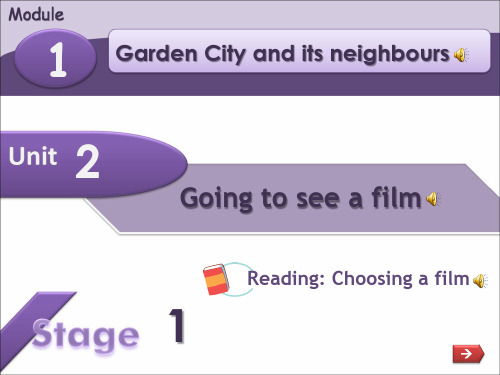
3. adventure (n.) Tom Sawyer’s Adventures
5. action (n.) We must take action to stop him. Action speaks louder than words. act (v.) He will act in next Star War. actor/ actress (n.) active (a.) He always takes an active part in sports. He’s a
Think and answer
Read and say
12
2-1
I’d like to see Superman.
12
Fiona must finish the job. (You)
She does sports every day. (He)
Tom hasn’t returned to home . (His parents)
It used to be a TV cartoon. This is the second movie
Kids love this cartoon very much.
Pleasant goats and big big wolf
It’s a war movie.
It’s in the future.
1 Garden City and its neighbours 2
Going to see a film
Reading: Choosing a film
1
Read and guess
It’s a movie about animals.
上海版牛津英语7B Unit2 notes
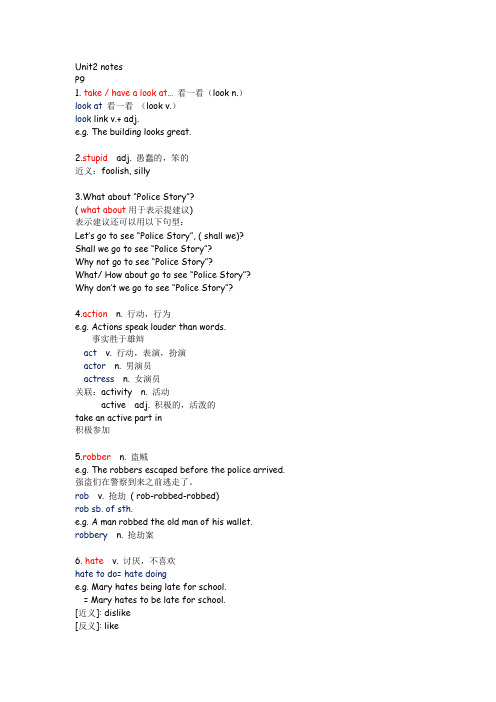
Unit2 notesP91. take / have a look at…看一看(look n.)look at看一看(look v.)look link v.+ adj.e.g. The building looks great.2.stupid adj. 愚蠢的,笨的近义:foolish, silly3.What about “Police Story”?( what about用于表示提建议)表示建议还可以用以下句型:Let’s go to see “Police Story”, ( shall we)?Shall we go to see “Police Story”?Why not go to see “Police Story”?What/ How about go to see “Police Story”?Why don’t we go to see “Police Story”?4.action n. 行动,行为e.g. Actions speak louder than words.事实胜于雄辩act v. 行动,表演,扮演actor n. 男演员actress n. 女演员关联:activity n. 活动active adj. 积极的,活泼的take an active part in积极参加5.robber n. 盗贼e.g. The robbers escaped before the police arrived. 强盗们在警察到来之前逃走了。
rob v. 抢劫( rob-robbed-robbed)rob sb. of sth.e.g. A man robbed the old man of his wallet. robbery n. 抢劫案6. hate v. 讨厌,不喜欢hate to do= hate doinge.g. Mary hates being late for school.= Mary hates to be late for school.[近义]: dislike[反义]: like7. adventure n. 冒险,奇遇(活动)[C]e.g. The adventure of Tom Sawyer.adventurer n. 冒险者adventurous adj. 冒险的8. action film 动作片love story 爱情电影cartoon 卡通片exciting film 惊险片cowboy story 西部片horror film 恐怖片police story 警匪片funny film 喜剧片detective story 侦探片adventure film 冒险故事P101. two forty-five show 2点45分的电影英语国家常用时间来表示电影的某个场次。
上海牛津英语7B讲解
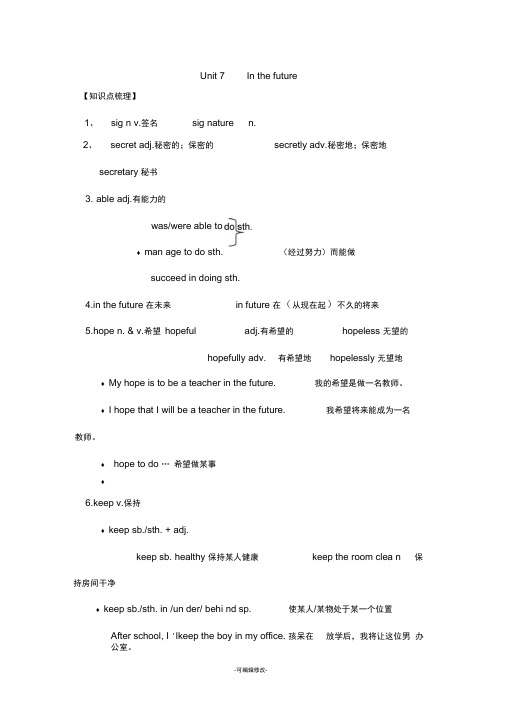
【知识点梳理】1、 sig n v.签名sig nature n.持房间干净♦ keep sb./sth. in /un der/ behi nd sp.使某人/某物处于某一个位置After school, I 'lkeep the boy in my office. 孩呆在办公室。
Unit 7In the future2、 secret adj.秘密的;保密的secretly adv.秘密地;保密地secretary 秘书 3. able adj.有能力的was/were able to♦ man age to do sth.succeed in doing sth.(经过努力)而能做4.in the future 在未来 in future 在(从现在起)不久的将来5.hope n. & v.希望 hopefuladj.有希望的hopeless 无望的 hopefully adv. 有希望地hopelessly 无望地♦ My hope is to be a teacher in the future. 我的希望是做一名教师。
教师。
♦ I hope that I will be a teacher in the future.我希望将来能成为一名♦ hope to do … 希望做某事♦6.keep v.保持♦ keep sb./sth. + adj.keep sb. healthy 保持某人健康keep the room clea n保放学后,我将让这位男She always keeps her ring in the secret place. 她总是把她的戒子放在这个秘密的地方。
♦keep doi ng sth. —直做某事He keeps writing his diary. 他一直写日记。
7. no air or water 既没有空气也没有水(否定句中的“和”用”or”)♦We 've got no bread or milk. 我们既没有面包也没有牛奶。
上海牛津7B各单元重点知识点梳理

Module 1 Garden City and its neighboursUnit 1 Writing a travel guide知识点梳理1.If 的用法If 引导的条件状语从句,表示“如果…”,当主句是一般将来时,从句用一般现在时。
e.g.We will have a picnic if it doesn't rain tomorrow.I will buy some food if there isn't enough food in the fridge.2.be famous/known for sth. 因为……而著名e.g. Shanghai is famous/known for its night views.be famous/known as sth. 作为……而著名e.g. Shanghai is famous/known as the"Shopping Paradise".3.one of+adj.(最高级)+n.(复数)e.g. Shanghai is one of the biggest cities in the world.Unit 2 Going to see a film知识点梳理1、电话用语(1)电话用语中使用This is…和Is that…?来表示“我是……”和“你是……?”May I speak to…表示“我能与……通话吗?”如果表示接电话的是本人,则回答:This is…speaking.或者直接说Speaking.(2)电话途中需中断一会儿,或者接电话的不是本人,则用:Hold on.别挂。
或I'll be back in a moment.我一会儿就回来。
2、So…I(我也……)Neither…I(我也不……)e.g.She is going to have a test tomorrow.So am I.They would not go to the shopping mall.Neither would I.3、指路用语(1)Turn left/right.(向左/向右)Turn left/right into…(向左/右转到……路)(2)Walk along…(沿着……路走)(3)You will find…on your left/right.你就会看到……在你的左/右边。
U3.3牛津上海英语 7B

Look and learn
the key _____ the door the key _____ the question
• I am a car without wheels. • You don’t see me on the roads. • No policemen can stop me. What am I?
• What do we use a cable car to do? • We use a cable car to carry people.
cable TV
Listen and identify
Look, listen and say
3-1
1
2
3
3-2
1
2
33-3 Nhomakorabea1
• What is a clock or a watch used for? • A clock or a watch is used for telling the time.
• What is black When it is clean and white when it is dirty? • What is a blackboard used for? • A blackboard is used for writing things.
How many uses of a cell phone can you think of?
How many uses of a mop can you think of? How many uses of a newspaper can you think of?
Read and guess
U3.2牛津上海英语 7B

You are a boy, aren’t you? You aren’t a boy, are you?
解题要领:把反意疑问句改成一般疑问句 Are you a boy?
9. We don’t have to do homework every day,
Yes, we do. ________? A:____ do we are we No, we aren’t. 10. We aren’t zombies, _____ ? A: _____ Yes, it will. 11. The spring won’t come, ______? will it A: _____ 12. Mr. Ni didn’t give you a test yesterday, did he ________? A: _____ have you 13. You haven’t long hair, _______? A: _____ have you 14. You have never seen an alien, _______? A: No, I haven’t. ____ 15. She can hardly lift a car to the air, _______? can she No, she can’t. A: ___ 16. There is little money in your bag, _______? A: is there ___
18. He takes people’s orders in a restaurant.
19. He finds out people’s secrets.
25.
Finish
Read and match
- 1、下载文档前请自行甄别文档内容的完整性,平台不提供额外的编辑、内容补充、找答案等附加服务。
- 2、"仅部分预览"的文档,不可在线预览部分如存在完整性等问题,可反馈申请退款(可完整预览的文档不适用该条件!)。
- 3、如文档侵犯您的权益,请联系客服反馈,我们会尽快为您处理(人工客服工作时间:9:00-18:30)。
七年级英语下册知识点总结Module 1 Garden City and its neighborsUnit 1 Writing a travel guideUnit 2 Going to see a filmUnit 3 A visit to Garden CityUnit 4 Let’s go shopping1. How are you getting on with your travel guide?get on with “进展”; “与……相处 (融洽)”I’m getting on well with the preparation.How are you getting on with your new classmates?2. be famous for… (以 /由于……出名)be (well) known as…(以 / 作为….被人知晓)Shanghai is famous for its night views.Shanghai is also known as a “Shopping Paradise” because there are a lot of department stores and huge shopping centres.上海被誉为“购物天堂”,因为上海有很多百货商店和大型购物中心。
Qingpu is famous for its fish and rice.3. It is + adj. + that (主语从句), 表示“……太……了”It is wonderful that we can have dinner on the 91st floor in Shanghai World Financial Centre.It is not surprising that many tourists come to visit Shanghai every year to shop.It is + adj. + to do sth.It is convenient to travel between Pudong and Puxi.=To travel between Pudong and Puxi is convenient.It is terrible to have dinner in this restaurant. The food tastes awful.=To have dinner in this restaurant is terrible.4. If you go there, you will see a huge open area with green grass, trees, fountains and pigeons. 主句用一般将来(或can, may, must),从句用一般现在时。
Firemen will have no water to put out fires if there is no rain.We’ll go on an outing if it doesn’t rain tomorrow.If you go there, you can find a famous church.5. The Maglev takes you to the international airport in about eight minutes.磁悬浮列车可以在八分钟之内将你带到国际机场。
take sb. to … “带某人去某地”in + 时间段, 表示 1.“在......之内”;2. “在……之后”My father used to take me to the park nearly every weekend.It takes you about eight minutes to travel to the international airport by Maglev.The artist could draw a horse in five minutes.I would like to be an English teacher in 10 years’ time.My father will be back from Australia in a week.Travelling in ShanghaiShanghai is in the east of China. It is an international city. It is famous for its night views, local snacks. It is also known as a “Shopping Paradise” because there are a lot of department stores and shopping centres.If you go to Shanghai, you will see People’s Square. It is in the centre of Shanghai. If you go to Pudong, you can see the Oriental Pearl TV Tower and Shanghai Science and Technology Museum. The Maglev takes you to the international airport in about eight minutes. At Sheshan you will find a famous church and an observatory. In Yu Garden, you can eat different kinds of local snacks.There are many interesting places in Shanghai. Therefore, it is not surprising that tourists come to visit Shanghai every year!6. take (have) a look at... = look at…Let’s take (have) a look at the film guide.Would you like to have a look at the photo?7. hate to do sth. = hate doing sth. 不喜欢,讨厌I hate action films.(I hate seeing action films./ I hate to see action films.)8. It’s an action film and it’s very exciting.action film (武打片,动作片); love story (爱情片);cartoon (卡通片); exciting film(惊险片);cowboy story (西部片); horror story (恐怖片);police story(警匪片); documentary(纪录片)9. be full of … “充满,挤满” (状态)be filled with … “灌满,装满” (动作)The bottle is full of milk. (The bottle is filled with milk.)At lunch time, the school dining room is always full of people.Our English teacher is a man full of energy.The street is full of people.(句意不变)→ The street is crowded with people.10.--How long is the film? 电影片长多久? -- It’s 120 minutes.→How long does the film last? It lasts 80 minutes.The duration of “Swan Lake” is 80 minutes.11.How much are they going to pay for the tickets altogether?Sb. pay… for sth.I paid 90 yuan for the coat last Saturday.→ How much did you pay for the coat last Saturday?Sth. costs sb. …The coat cost me 90 yuan last Saturday.The experiment cost him two years of hard work.Sb. spends … on sth.Every morning Peter spends half an hour on /(in) reading English.I spent one and a half hours doing my homework last night.It takes sb. … to do sth.It took us 30 minutes to get to the Grand View Garden by car.It takes me five minutes to walk to school in the morning.You can take a bus there. (You can go there by bus.)We took a cable car up to the top of the mountain.Welcome to SheshanSuggested questions:1. Where is Sheshan in Shanghai?2. Which places can you visit in Sheshan?3. How can you go there and what do you think of Sheshan?Sheshan is in the southwest of Shanghai. It’s about 30 kilometres away from the centre of the city.There are many interesting places in Sheshan. You can visit the Forest Park and there is a famous church at the top of the mountain.If you go there, you can also find an observatory.It’s a beautif ul resort. You can go there by bus. I think you will enjoy yourself there.12. for prep.达(时间段)之久;since prep. & conj. 自从(过去时间点)以来My uncle has been in the Army for 3 years.= (My uncle joined the Army 3 years ago.)Peter has worked in this company since 2005.= (Peter started to work in this company in 2005.)= (Peter has worked in this company for 4 years.)I have had the digital camera for 2 years.= I bought the digital camera 2 years ago.My grandfather has lived in the old town since he was born.I haven’t seen you for a long time.His father has been in Shanghai for quite a few years.13. Aunt Betty works in a company in Beijing, doesn’t she?She often has lunch at school, doesn’t she?It’s very cold today, isn’t it?Your father is unhappy, isn’t he?It is impossible to learn English well without remembering more words, isn’t it?My sister never tells a lie, does she?She can hardly speak Chinese, can she?He was seldom late for school, was he?I am an English teacher, aren’t I?(注:回答此类问题时,应按实际情况当一般疑问句作答,用Yes或No;但回答“前否后肯” 的句子时,它的中英文意思则不同。
